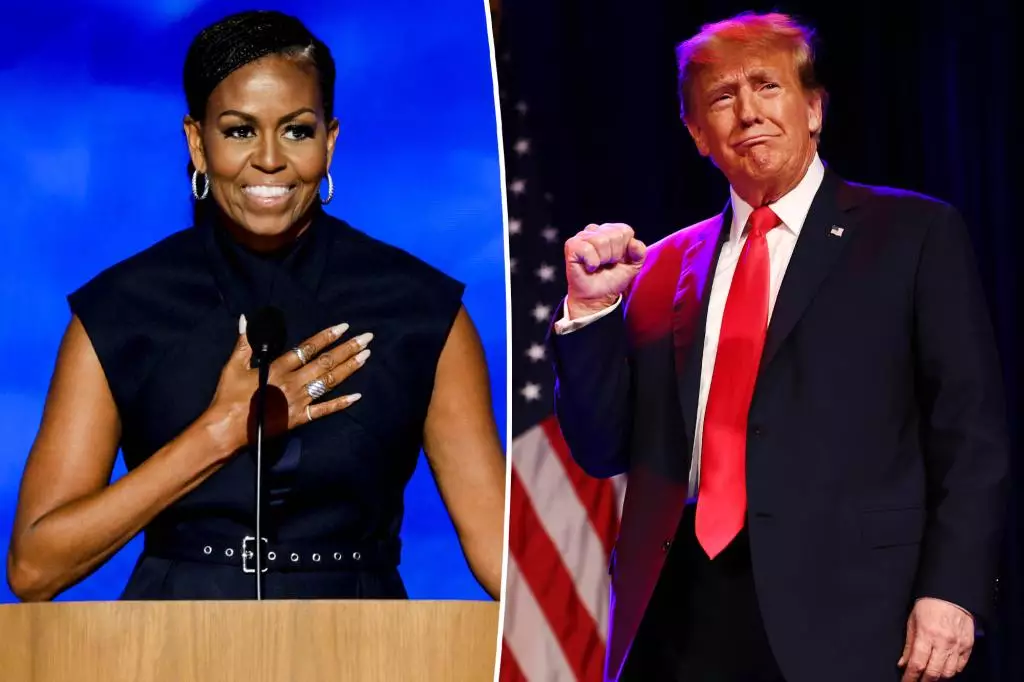In the landscape of American politics, the actions of a former First Lady can speak volumes about the current political climate. Michelle Obama’s decision to skip Donald Trump’s inauguration is more than just a personal choice; it is a bold statement against a political figure she has publicly criticized. While her husband, former President Barack Obama, is reportedly engaging with Trump on some level, Michelle’s stance exemplifies a deliberate refusal to participate in the normalization of a presidency she has denounced.
Michelle Obama has positioned herself as a figure of integrity and authenticity throughout her public life. Her absence from Trump’s inauguration clearly reflects her unwillingness to endorse a leadership style she regards as detrimental to the values she upholds. While the former president may have chosen to appear friendly with Trump, Michelle’s decision to absent herself is a pointed contrast. It signifies her discontent and establishes her position firmly against the Trump administration, which she believes embodies a “backwards leadership.”
Reports suggest that she was on an “extended holiday vacation” in Hawaii during the inauguration, leading to speculation about whether this was merely a coincidence or a calculated absence. The official statement from the Obama camp—indicating her non-attendance without offering a specific reason—further cements the notion that her absence is intentional. The silence surrounding her absence speaks volumes about her disapproval of the current political climate.
The background to Michelle Obama’s stance lies in the long-standing animosity between the Trump camp and the Obama family, particularly due to Trump’s promotion of the “birther” conspiracy theory, questioning Barack Obama’s birthplace. This conspiracy not only targeted Obama’s integrity but also had racial undertones that underscored Trump’s narrow worldview, which Michelle has openly criticized. Her notable remarks during the Democratic National Convention, where she described Trump’s attempts to instill fear as reflective of his limited understanding of America, highlight her commitment to advocating for diversity and inclusion amidst political divisiveness.
The choice not to attend the inauguration resonates with her earlier statements during the 2020 election, when she urged voters not to “normalize” Trump’s brand of politics. Her words, claiming that most Americans would not receive the ‘grace of failing forward’ as Trump allegedly did, accentuate her belief in accountability and the importance of ethical leadership. By opting out of the inauguration, she reinforces this message, reminding the public of the importance of principles over political expediency.
Michelle Obama is known for her poise and grace, but her recent political expressions suggest a willingness to step into a more combative role if necessary. Her previous attendance at Trump’s inauguration in 2017, despite her discomfort, indicates an attempt to foster unity. However, four years later, the political landscape has changed, and the stakes are dramatically higher. Her absence serves as a poignant reminder that not all political employees are willing to simply play nice in the face of policies and rhetoric they find fundamentally flawed.
As political figures navigate the complex waters of partisanship, Michelle’s stance may set a precedent for how future first ladies engage—or disengage—with their successors. It raises questions about authenticity in political participation and whether former leaders should adapt to new administrations or stand firm in their convictions, regardless of the political fallout.
Ultimately, Michelle Obama’s choice not to attend the inauguration acts as a powerful statement of authenticity in a time when many individuals feel increasingly disillusioned by traditional political norms. Her absence communicates a strong message: that support for a leader has its limits, especially when that leadership is viewed as a regression of the values she stands for. It acts as a call to action for citizens to remain vigilant and rooted in their beliefs, regardless of the prevailing political winds.
Michelle Obama’s decision transcends the immediate circumstances of the inauguration itself; it resonates with a broader narrative of integrity, belonging, and the role of leadership in today’s America. Her silent protest reinforces the idea that there are times when silence speaks louder than words, a sentiment that may well inspire others to reflect on their own political choices and the importance of staying true to one’s principles.
